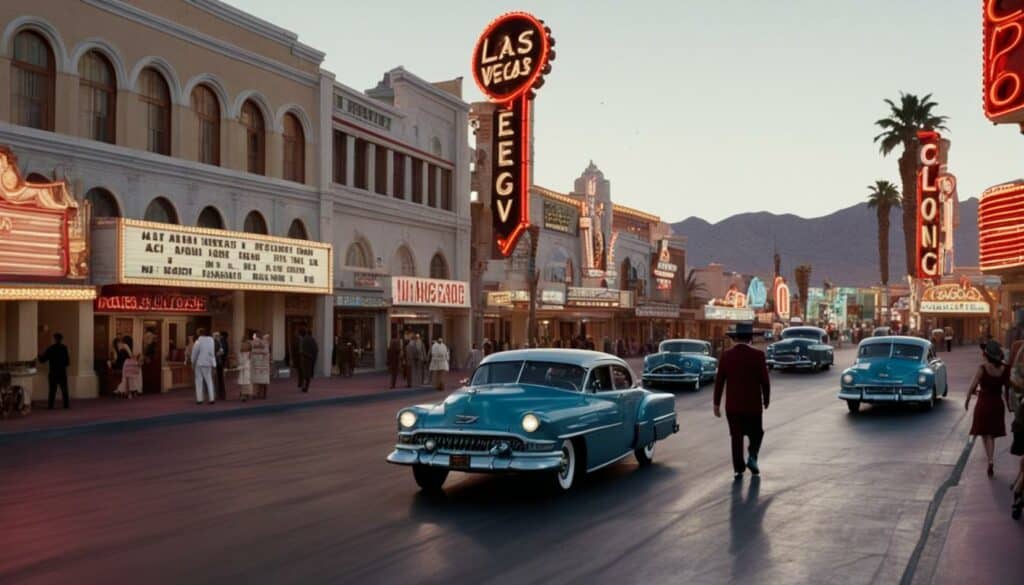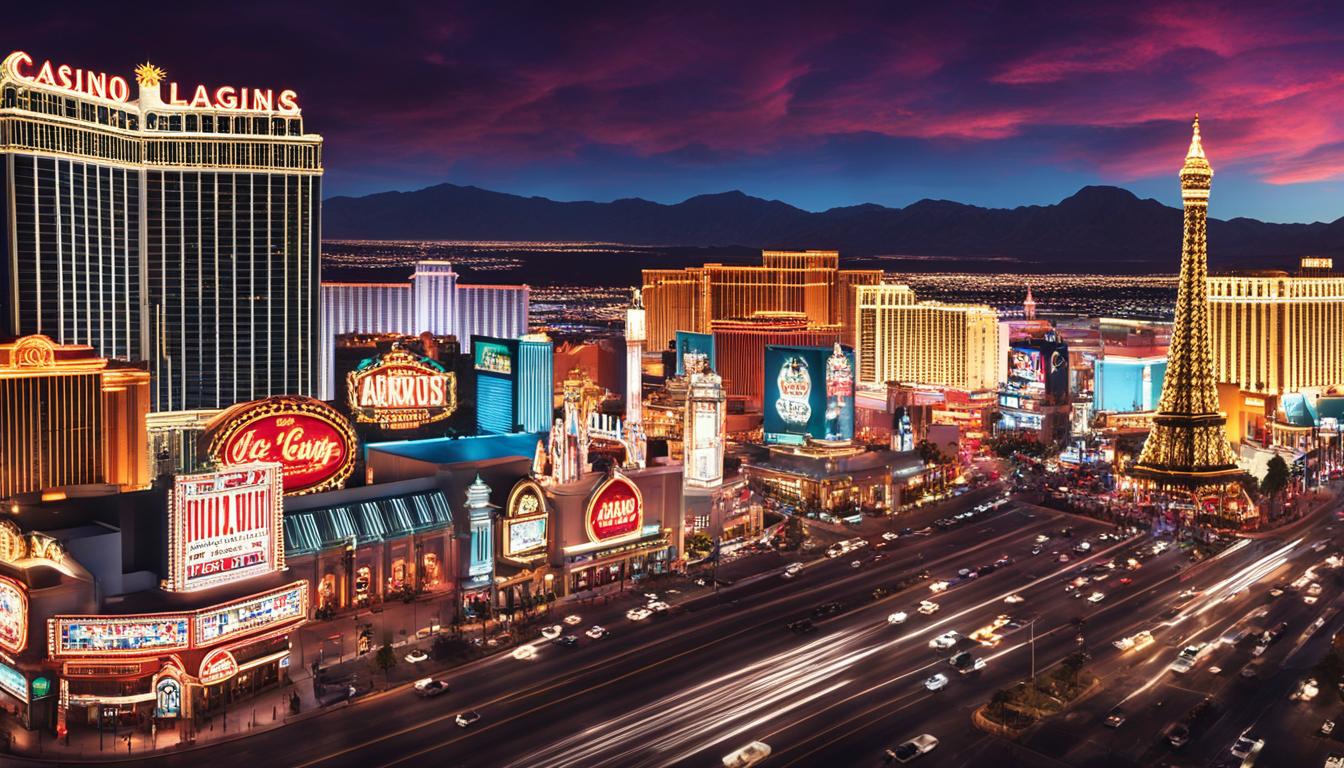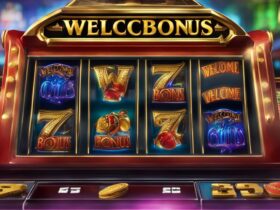When it comes to gambling in the United States, few places are as synonymous with the activity as Las Vegas. The glitz, the glamour, and the opportunity to strike it rich draws millions of visitors each year, but have you ever wondered who started it all? Delving into the history of gambling in Las Vegas reveals a fascinating tale of pioneering individuals who laid the groundwork for the city we know and love today.
From the early days of betting on horse races to the rise of modern-day casinos and online gambling platforms, the history of gambling in Las Vegas is a rich and complex story. In this article, we’ll explore the pioneers of Las Vegas gambling, the first casinos to open in the city, famous gamblers who frequented the casinos, and how Las Vegas evolved into the casino empire it is today. Let’s dive in and discover who started gambling in Las Vegas and the role pioneers of Las Vegas gambling played in shaping the city’s history.
The Early Days of Gambling in Las Vegas
The early days of gambling in Las Vegas were marked by the establishment of small, unassuming gambling establishments that would later grow into the flashy casinos the city is known for today.
The first casino to open its doors in Las Vegas was the Golden Gate Casino, which debuted in 1906. At the time, the casino consisted of a single room with a handful of slot machines and a few table games. However, as the popularity of gambling grew in the city, so too did the size and scope of the casinos.
In the 1930s, the El Rancho Vegas Resort opened its doors, becoming the first hotel and casino in Las Vegas to cater to tourists. The El Cortez Casino followed soon after, featuring the city’s first sports book.
Throughout the 1940s and 1950s, the Las Vegas Strip began to take shape, as iconic casinos like the Flamingo, Sands, and Sahara were built. These casinos featured elaborate designs and offered a wide array of games and entertainment options, solidifying Las Vegas as the premier gambling destination in the United States.
Despite the city’s growth and development, the early days of gambling in Las Vegas remain an important part of its history. From small, humble beginnings, the city’s casinos have grown into some of the most opulent and luxurious in the world.
The Pioneers of Las Vegas Gambling
The early days of gambling in Las Vegas were greatly influenced by the gambling pioneers in Sin City, also known as the founding fathers of Las Vegas gambling. These pioneering individuals played a significant role in shaping the city’s gambling scene and establishing it as a premier destination for gambling enthusiasts.
One of the most notable pioneers of Las Vegas gambling was Benjamin “Bugsy” Siegel, who envisioned Las Vegas as a city where gambling could thrive and invested heavily in the Flamingo Hotel and Casino. Siegel’s vision and determination helped pave the way for the development of Las Vegas as a major player in the gambling industry.
Another important pioneer was William “Bill” Harrah, who founded Harrah’s Hotel and Casino and revolutionized the industry by offering loyalty programs to players. His innovative marketing strategies greatly contributed to the growth of the industry in Las Vegas.
Other pioneering individuals include Jay Sarno, who built Caesars Palace and Circus Circus, and Kirk Kerkorian, who developed the International Hotel and Casino, now known as the Westgate Las Vegas Resort and Casino.
These pioneering individuals not only established the gambling industry in Las Vegas but also shaped it through their innovations and unique approaches. Their contributions and influence continue to impact the industry to this day.
A website with more than 1000 games to choose from สล็อตเว็บตรง
The First Casinos in Las Vegas
Las Vegas, known as the gambling capital of the world, owes much of its reputation to the first casinos that opened in the city.
The first casino to open its doors to the public was the Golden Gate Casino in 1906, which was originally named the Hotel Nevada. The casino offered games such as faro, craps, and roulette to its patrons.
Another notable casino to open in the early days of Las Vegas was the Northern Club, which opened in 1931. The casino offered blackjack, craps, roulette, and other games to its customers.
However, it was the opening of Bugsy Siegel’s Flamingo Hotel and Casino in 1946 that marked a turning point in Las Vegas’s gambling history. The casino was the first luxury hotel and casino on the strip, featuring a wide range of games and amenities such as a showroom, lounge, and spa. The Flamingo helped establish Las Vegas as a premier gambling destination.

Other notable casinos that opened in the following years included the Sahara Hotel and Casino, the Riviera, and the Sands. The success of these casinos spurred the development of more casinos and resorts in Las Vegas, leading to the city’s eventual transformation into a thriving entertainment hub that attracts millions of visitors every year.
Famous Gamblers in Las Vegas
Las Vegas has long been a mecca for high-stakes gambling and has played host to some of the most famous gamblers in history. One of the most well-known was Benny Binion, who was famous for founding the Binion’s Horseshoe casino in downtown Las Vegas. Binion had a reputation for being a shrewd businessman and a savvy gambler who never hesitated to take a big risk.
Another famous gambler from Las Vegas was Stu Ungar, who was widely regarded as one of the best poker players of all time. Ungar won three World Series of Poker championships in the 1980s and was known for his seemingly innate ability to read his opponents and make lightning-fast decisions.
“Poker is a lot like sex. Everyone thinks they’re the best, but most don’t have a clue what they’re doing.” – Stu Ungar
Finally, we can’t mention famous gamblers in Las Vegas without talking about Phil Ivey. Ivey is widely regarded as one of the best all-around gamblers in the world and has won millions playing everything from poker to baccarat. He is known for his quiet demeanor and his ability to stay cool under pressure.

“In gambling, the many must lose in order that the few may win.” – George Bernard Shaw
The Rise of Las Vegas as a Casino Empire
With the legalization of gambling in 1931, Las Vegas became a hub for casinos in the United States. In the 1940s and 1950s, the city saw an exponential growth in the number of resorts and casinos. The opening of the Flamingo Hotel and Casino in 1946 by mobster Bugsy Siegel marked the beginning of the modern era of Las Vegas gambling. This resort was the first to offer a luxurious experience, attracting high rollers and Hollywood celebrities.
The rise of Las Vegas as a casino empire can also be attributed to the development of the Las Vegas Strip. The strip is a 4.2-mile stretch of Las Vegas Boulevard that is home to some of the world’s most iconic resorts and casinos. In the 1960s, the strip saw rapid development with the opening of the Stardust, the Riviera, and the Circus Circus.
During the 1970s and 1980s, Las Vegas underwent massive renovations and expansions, leading to the construction of mega-resorts such as the Mirage, the Excalibur, and the Luxor. These resorts featured large casinos, multiple restaurants and bars, shopping centers, and entertainment venues.
Today, Las Vegas remains one of the most popular gambling destinations in the world, with over 100 casinos and resorts. The city’s history of gambling and innovation has made it a symbol of the American dream and an inspiration for aspiring casino operators.
The Evolution of Gambling in Las Vegas
Over the years, the gambling industry in Las Vegas has evolved to meet changing demands and trends. With the rapid development of technology and entertainment, casinos have adapted to appeal to a wider audience and stay ahead of the game.
One significant change has been the introduction of new games. While traditional table games like poker, blackjack, and craps remain popular, casinos now feature a wider variety of options to appeal to a broader range of players. Games like baccarat, Pai Gow poker, and Caribbean Stud have become staples in many casinos, along with newer games like Three Card Poker and Let It Ride.
Additionally, technology has played a significant role in the evolution of gambling in Las Vegas. The introduction of video poker and slot machines in the 1970s transformed the way players interact with games, and today, many casinos feature state-of-the-art machines with high-tech graphics and interactive features. Mobile gaming also allows players to enjoy their favorite games from anywhere at any time.
Entertainment has also become an integral part of the Las Vegas gambling experience. Casinos now offer a full range of entertainment options, from concerts and shows to fine dining and spas. This shift has helped to attract a wider audience of non-gamblers, making Las Vegas a destination for all types of visitors.
“The evolution of gambling in Las Vegas has allowed the city to remain at the forefront of the industry, appealing to both traditional and modern players.”
Conclusion
Las Vegas has come a long way since its early days as a desert outpost. Today, it is a thriving metropolis, with a global reputation for entertainment, luxury, and, of course, gambling. The history of gambling in Las Vegas is a fascinating one, shaped by the pioneers who laid the foundation for the city’s growth.
These visionary individuals, like Bugsy Siegel and Benny Binion, took a chance on a fledgling industry and transformed it into a multibillion-dollar behemoth. They built the first casinos, introduced new games and technologies, and created a culture of excitement and indulgence that continues to attract millions of visitors each year.
As Las Vegas evolved into a casino empire, it attracted a new generation of gamblers, including celebrities like Frank Sinatra, Dean Martin, and Elvis Presley. These famous names brought even more attention to the city, helping to cement its reputation as the ultimate gaming destination.
Today, Las Vegas is home to some of the world’s largest and most luxurious casinos, as well as countless smaller establishments that provide a range of gaming options for visitors. The industry continues to evolve, with new games, technologies, and entertainment options being introduced all the time.
Despite these changes, however, the pioneering individuals who first established Las Vegas as a gambling mecca will always be remembered as the true pioneers of the industry. Their contributions were instrumental in creating the thriving, exciting, and ever-evolving Las Vegas we know today, and their legacy will continue to inspire generations of gamblers for years to come.
FAQ
Who were the pioneers of Las Vegas gambling?
The pioneers of Las Vegas gambling include notable individuals such as Benjamin “Bugsy” Siegel, William “Billy” Wilkerson, and John “Jackie” Gaughan. These visionaries played a significant role in establishing the gambling culture in Las Vegas.
What is the history of gambling in Las Vegas?
Gambling in Las Vegas dates back to the early 1900s when the city was a small railroad town. The legalization of gambling in 1931 paved the way for the development of casinos and resorts, ultimately transforming Las Vegas into the world-renowned gambling destination it is today.
When did gambling begin in Las Vegas?
Gambling began in Las Vegas shortly after the city was founded in 1905. However, it was not until the 1930s, with the legalization of gambling, that the industry started to flourish and attract visitors from across the country.
What were the first casinos in Las Vegas?
The first casinos in Las Vegas included the Golden Gate Hotel and Casino, which opened in 1906, and the El Rancho Vegas, which opened in 1941. These establishments paved the way for the development of the iconic Las Vegas Strip.
Who were some famous gamblers in Las Vegas?
Las Vegas has seen its fair share of famous gamblers over the years. Some notable names include Frank Sinatra, Howard Hughes, and Benny Binion. These individuals not only enjoyed gambling but also had a significant impact on the city’s gambling culture.
How did Las Vegas become a casino empire?
Las Vegas became a casino empire through the efforts of visionary individuals who invested in the city’s gambling industry. The opening of iconic casinos such as the Flamingo, the Sands, and the Dunes brought in high-profile entertainers and attracted a wealth of tourists, solidifying Las Vegas as the ultimate casino destination.
What has been the evolution of gambling in Las Vegas?
The gambling industry in Las Vegas has experienced significant evolution over the years. From the introduction of slot machines and card games to the rise of mega-resorts and the incorporation of technology, Las Vegas has continually adapted to meet the demands of an ever-changing market.











Leave a Review